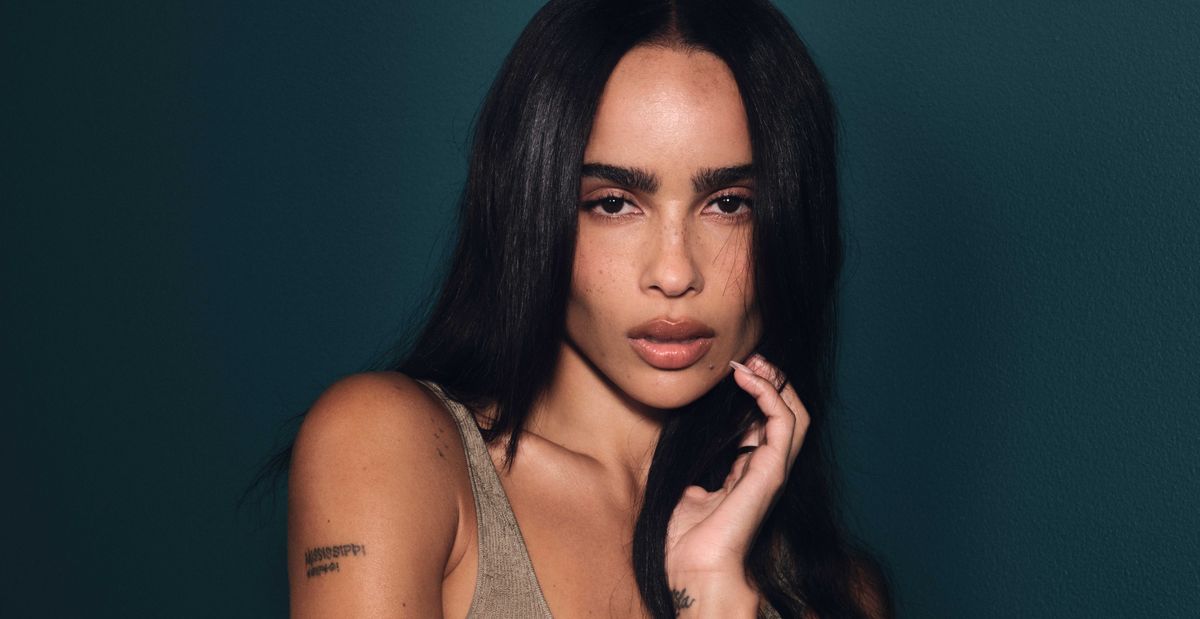
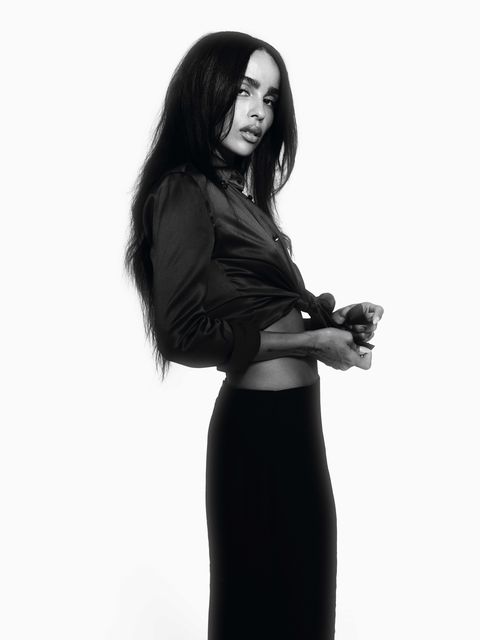
Shirt, $990, skirt, $1,690, Ralph Lauren Collection.
SHARIF HAMZA
Tomorrow Zoë Kravitz will be doing something for the first time. Over five years ago, she began writing her first film, Pussy Island, a thriller about the power dynamics that play out after a waitress joins a wealthy philanthropist for a wild and mysterious gathering on his private island. After three months of filming in Mexico, she’s returned home to New York City, and 24 hours after our conversation over lunch in Chelsea, she will begin editing her movie. “It’s like a rebirth of the film,” Kravitz says of the editing process. “You write the film. Then you make the film. Then you make the film again.” This step, like all the others before it, brings her one exciting and terrifying step closer to a whole new identity: director.
As she prepares to enter a new phase in Hollywood, what amazes Kravitz about her career to date? Starring alongside Nicole Kidman and Reese Witherspoon in Big Little Lies. Producing a cult hit with High Fidelity. Embodying the iconic female character Catwoman in The Batman. Everything, really. “I wasn’t the kind of person to think about my plan or what I thought I was going to be,” Kravitz tells me. “I really thought I would be producing independent films and theater. The fact that I’ve been working for this long and have been in the kinds of movies I’ve been in, and now that I’ve directed a film, it’s crazy.”
Kravitz cowrote Pussy Island with her writing partner E. T. Feigenbaum in 8- to 12-hour shifts, the pair sitting side by side. “The story has changed many times. I started writing it before Harvey Weinstein was exposed, so the world was different. It came from a very different place, and it did start very much like an angry feminist script,” she explains. “Then, as the world changed and the conversation evolved, I got to sit back and watch what was going on.” While Kravitz didn’t initially plan to direct the film, it became clear that it wouldn’t work any other way. “I just didn’t know anyone else who I felt comfortable handing it over to,” she says. “When you work on something for so long, you see it in your mind’s eye, and I didn’t know who else would understand it the way that I did. If it comes from your mind and you dream it into reality, it feels like giving birth in a way.”
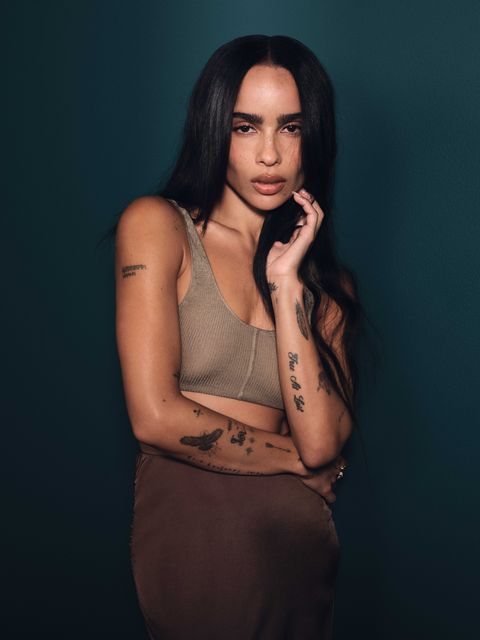
Bralette, $1,290, skirt, $2,690, Saint Laurent by Anthony Vaccarello. Rings, Tiffany & Co., from $1,990.
Sharif Hamza
On the role that changed everything
“Bonnie from Big Little Lies and then Selina Kyle from The Batman—those had the biggest impact. They changed what I had the opportunity to do. When Jean-Marc Vallée gave me that job [on Big Little Lies], I was working with some of the best actors of our time all of a sudden. I had access to a different audience and was able to learn from all of those amazing women.”
On her mentor
“Reese Witherspoon and I became very, very close after Big Little Lies. She’s such a strong businesswoman and is really driven to inspire and educate other women in the industry to take up more space. She’s someone who I admire and who I always call when I have a question or something I want to make or produce, or a book I want to adapt.”
On what’s changed in Hollywood post-#MeToo
“We became trendy. [Laughs] It’s cool in a way. When I was trying to find a director of photography for my movie and I wanted a woman, I couldn’t find one. All of the DPs who are female are booked, because that’s cool now or because people are paying more attention. If people are afraid to say they didn’t like a piece of art because it was made by a women, it feels to me that we aren’t allowing it to truly affect us. Art isn’t about liking. It’s about emotion, debate. Art is about conversation.”
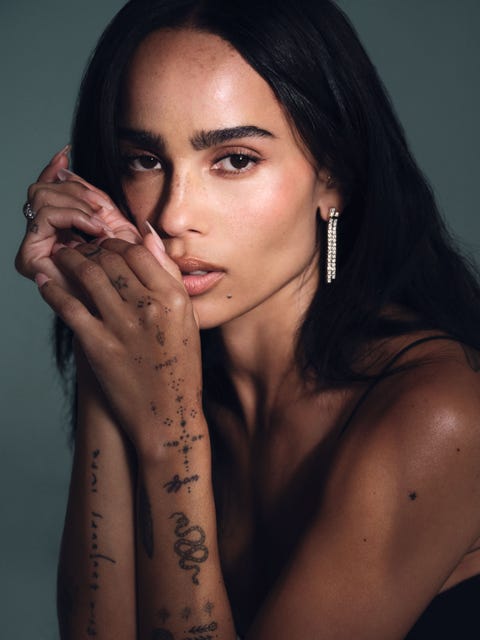
Earrings, ring, Tiffany & Co. Top, Miu Miu, $750.
Sharif Hamza
Her best advice
“Always challenge what people say you can and can’t do, and what parts are written for you. I used to be told I couldn’t have a role because they wanted a white girl. Now we’re in this place where you can only play a role if you are that identity, which I think is very complicated. Can a person who can see play a blind person? I don’t know the answer. It’s all very blurry. There’s not necessarily a right side and a wrong side. It’s almost like it was so bad for so long that now we have to sit in this uncomfortable place that also doesn’t make a lot of sense, trying to even things out. It’s just like, Who’s in charge and where do we draw the line? I don’t know the answer to that.”
On being a role model
“I don’t know if I could be considered a role model, but I think allowing yourself to be imperfect is probably the best thing you can do for yourself right now. In this time of social media where people constantly present perfection, that’s really important, so I try to allow myself to be as human as possible. We live in this time where people are triggered and people are sensitive. But then people are saying horrible, horrible things to each other on the internet. I don’t understand. It’s all about power. Who’s on top? And, ‘I felt like I was on bottom, and now I get to be on top, and now I get to point my finger at you’ and it’s all just a power struggle.”
People confuse social media with reality. It’s not real.”
On what keeps her grounded
“Life is crazy—it could end at any time. If that doesn’t keep you grounded, I don’t know what would.”
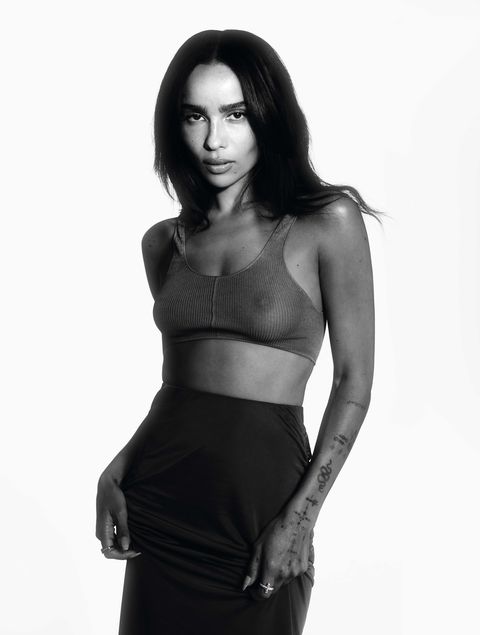
Bralette, $1,290, skirt, $2,690, Saint Laurent by Anthony Vaccarello. Rings, Tiffany & Co., from $1,990.
SHARIF HAMZA
On her personal style
“It’s changed over the years. When I was younger, I loved to dress up and I loved challenging what I was supposed to be wearing. Now, in my personal life, I’m mostly about comfort. I love beautiful things, but I really want to be comfortable. When you can do both, it’s incredible. I want to grab things that are compatible and just put them on without thinking about it.”
On social media
“I didn’t really sit and think about [using Instagram to call out Hulu for canceling High Fidelity], which is sometimes my problem. I’m a very impulsive person. That’s one of the problems with social media in general. You can just do something without thinking. There’s good things about that, in terms of the fact that that was my honest opinion in that moment and still kind of is, and I said it. But we’re also living in a time where it’s good to be thoughtful about what you say.”
“Social media is a big experiment that we’re all participating in, and to pretend like we understand it is a joke. I have had my ups and downs with it. I’m sure it’s helped my career in some ways, but I also think it’s hurt it. With actors specifically, it’s difficult because I think we give too much information [about ourselves] and it makes it difficult for us to disappear into roles. The actors that I grew up loving and watching, I didn’t know anything about them. That’s part of what made them so interesting.”
“People confuse social media with reality. It’s not real. What I mean by that is that I think people feel that if they feel something and they don’t express it on social media, then it doesn’t count. If you care about something and you don’t talk about it on social media, then you don’t care about it. If you write about one thing but not another thing, you care about one more than the other. None of that’s real. Or true.”
“When something [in the news] happens, people expect people, specifically celebrities, to write about it. What if we’re still processing it? What if we don’t have enough information and we don’t know how we feel yet? Maybe we’re at home crying in our bedrooms about it and talking to our friends about it over dinner.”
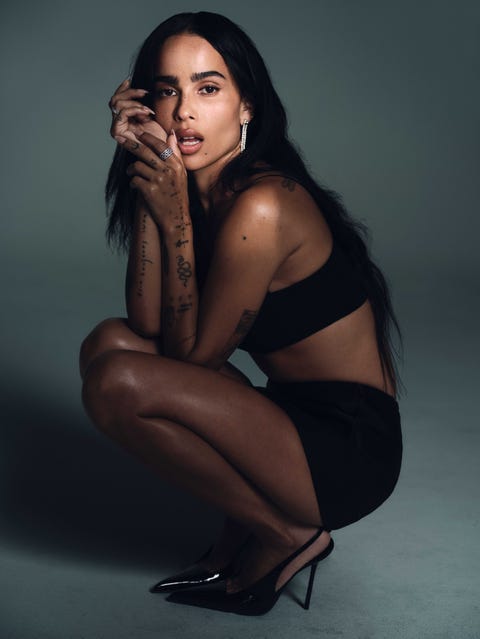
Top, Miu Miu, $750. Skirt, Prada, $1,720. Earrings, rings, Tiffany & Co. Slingbacks, Saint Laurent by Anthony Vaccarello, $995.
Sharif Hamza
On the differences between making music and acting
“Music is really scary for me because it feels more personal. It feels like my diary. Now with the internet, exposing yourself is really terrifying. Acting feels safer because you’re a part of something with a group of people who all have a common goal. As an actor, you’re a participant and a tool to help someone else’s dream come true.”
On fear
“I want to try to live without fear. That really is my goal in my personal life and in my career. I think fear is crippling and dangerous. It probably creates sickness—this fear of getting in trouble or doing something wrong or not being adored or not being liked. I think, especially as a woman, there’s a lot of pressure to be adored, and that’s not what art’s about either.”
On the overlap between gender equity and racial equity
“It’s all about having actual conversation and I think absolutely none of that’s happening when people are afraid. I think everybody’s afraid to say the wrong thing, to ask the wrong question, to get in trouble, for someone to bring up something they did a long time ago. It’s just like we’re stuck in this loop now. It’s a war zone.”
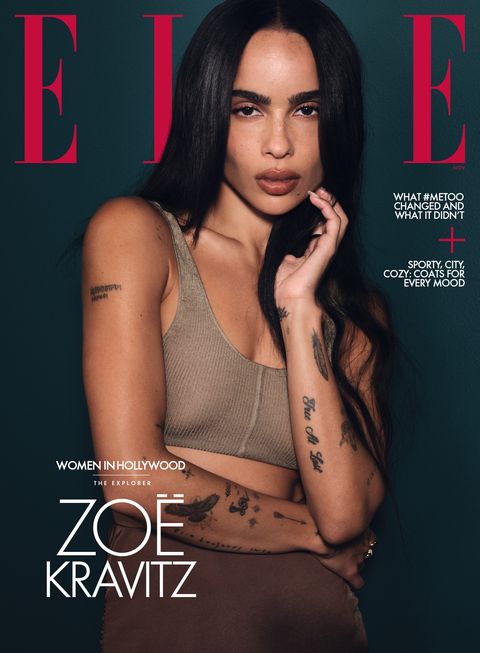
Bralette, $1,290, skirt, $2,690, Saint Laurent by Anthony Vaccarello, Saint Laurent (NYC), Rings, Tiffany & Co., from $1,990.
Sharif Hamza
Hair by Nikki Nelms for Maui Moisture; Makeup by Nina Park for YSL Beauty; Manicure by Aki Hirayama for Aprés Nail; Set design by Colin Lytton; Produced by Travis Kiewel for That One Production. On Kravitz: All Hours Foundation, Rouge Pur Couture The Bold Lipstick, Mascara Volume Effet Faux Cils, Couture Clutch in Desert Nude. All, YSL Beauty.
This article appears in the November 2022 issue of ELLE.
Adrienne Gaffney is an associate editor at ELLE who previously worked at WSJ Magazine and Vanity Fair.
